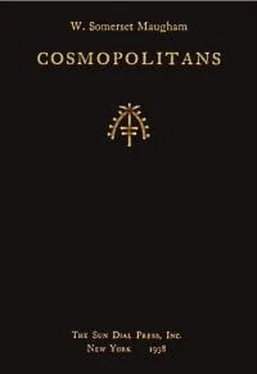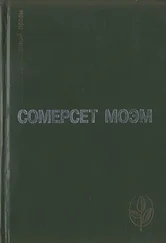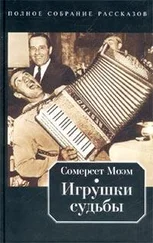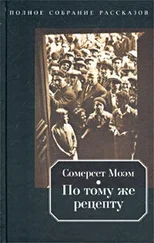Уильям Моэм - Cosmopolitans
Здесь есть возможность читать онлайн «Уильям Моэм - Cosmopolitans» весь текст электронной книги совершенно бесплатно (целиком полную версию без сокращений). В некоторых случаях можно слушать аудио, скачать через торрент в формате fb2 и присутствует краткое содержание. Город: New York, Год выпуска: 1938, Издательство: The Sun Dial Press, INC., Жанр: Классическая проза, short_story, на английском языке. Описание произведения, (предисловие) а так же отзывы посетителей доступны на портале библиотеки ЛибКат.
- Название:Cosmopolitans
- Автор:
- Издательство:The Sun Dial Press, INC.
- Жанр:
- Год:1938
- Город:New York
- ISBN:нет данных
- Рейтинг книги:5 / 5. Голосов: 1
-
Избранное:Добавить в избранное
- Отзывы:
-
Ваша оценка:
- 100
- 1
- 2
- 3
- 4
- 5
Cosmopolitans: краткое содержание, описание и аннотация
Предлагаем к чтению аннотацию, описание, краткое содержание или предисловие (зависит от того, что написал сам автор книги «Cosmopolitans»). Если вы не нашли необходимую информацию о книге — напишите в комментариях, мы постараемся отыскать её.
Cosmopolitans — читать онлайн бесплатно полную книгу (весь текст) целиком
Ниже представлен текст книги, разбитый по страницам. Система сохранения места последней прочитанной страницы, позволяет с удобством читать онлайн бесплатно книгу «Cosmopolitans», без необходимости каждый раз заново искать на чём Вы остановились. Поставьте закладку, и сможете в любой момент перейти на страницу, на которой закончили чтение.
Интервал:
Закладка:
When Roger told me that he had at last persuaded her to marry him, I wished him joy.
“I hope you’ll be good friends,” he said. “She’s a little afraid of you, you know; she thinks you’re callous.”
“Upon my word I don’t know why she should think that.”
“You do like her, don’t you?”
“Very much.”
“She’s had a rotten time, poor dear. I feel so dreadfully sorry for her.”
“Yes,” I said.
I couldn’t say less. I knew she was stupid and I thought she was scheming. My own belief was that she was as hard as nails.
The first time I met her we had played bridge together and when she was my partner she twice trumped my best card. I behaved like an angel, but I confess that I thought if the tears were going to well up into anybody’s eyes they should have been mine rather than hers. And when, having by the end of the evening lost a good deal of money to me, she said she would send me a cheque and never did, I could not but think that I and not she should have worn a pathetic expression when next we met.
Roger introduced her to his friends. He gave her lovely jewels. He took her here, there, and everywhere. Their marriage was announced for the immediate future. Roger was very happy. He was committing a good action and at the same time doing something he had very much a mind to. It is an uncommon situation and it is not surprising if he was a trifle more pleased with himself than was altogether becoming.
Then, on a sudden, he fell out of love. I do not know why. It could hardly have been that he grew tired of her conversation, for she had never had any conversation. Perhaps it was merely that this pathetic look of hers ceased to wring his heart-strings. His eyes were opened and he was once more the shrewd man of the world he had been. He became acutely conscious that Ruth Barlow had made up her mind to marry him and he swore a solemn oath that nothing would induce him to marry Ruth Barlow. But he was in a quandary. Now that he was in possession of his senses he saw with clearness the sort of woman he had to deal with and he was aware that, if he asked her to release him, she would (in her appealing way) assess her wounded feelings at an immoderately high figure. Besides, it is always awkward for a man to jilt a woman. People are apt to think he has behaved badly.
Roger kept his own counsel. He gave neither by word nor gesture an indication that his feelings towards Ruth Barlow had changed. He remained attentive to all her wishes; he took her to dine at restaurants, they went to the play together, he sent her flowers; he was sympathetic and charming. They had made up their minds that they would be married as soon as they found a house that suited them, for he lived in chambers and she in furnished rooms; and they set about looking at desirable residences. The agents sent Roger orders to view and he took Ruth to see a number of houses. It was very hard to find anything that was quite satisfactory. Roger applied to more agents. They visited house after house. They went over them thoroughly, examining them from the cellars in the basement to the attics under the roof. Sometimes they were too large and sometimes they were too small; sometimes they were too far from the centre of things and sometimes they were too close; sometimes they were too expensive and sometimes they wanted too many repairs; sometimes they were too stuffy and sometimes they were too airy; sometimes they were too dark and sometimes they were too bleak. Roger always found a fault that made the house unsuitable. Of course he was hard to please; he could not bear to ask his dear Ruth to live in any but the perfect house, and the perfect house wanted finding. House-hunting is a tiring and a tiresome business and presently Ruth began to grow peevish. Roger begged her to have patience; somewhere, surely, existed the very house they were looking for, and it only needed a little perseverance and they would find it. They looked at hundreds of houses; they climbed thousands of stairs; they inspected innumerable kitchens. Ruth was exhausted and more than once lost her temper.
“If you don’t find a house soon,” she said, “I shall have to reconsider my position. Why, if you go on like this we shan’t be married for years.”
“Don’t say that,” he answered, “I beseech you to have patience. I’ve just received some entirely new lists from agents I’ve only just heard of. There must be at least sixty houses on them.”
They set out on the chase again. They looked at more houses and more houses. For two years they looked at houses. Ruth grew silent and scornful: her pathetic, beautiful eyes acquired an expression that was almost sullen. There are limits to human endurance. Mrs Barlow had the patience of an angel, but at last she revolted.
“Do you want to marry me or do you not?” she asked him.
There was an unaccustomed hardness in her voice, but it did not affect the gentleness of his reply.
“Of course I do. We’ll be married the very moment we find a house. By the way, I’ve just heard of something that might suit us.”
“I don’t feel well enough to look at any more houses just yet.”
“Poor dear, I was afraid you were looking rather tired.”
Ruth Barlow took to her bed. She would not see Roger and he had to content himself with calling at her lodgings to inquire and sending her flowers. He was as ever assiduous and gallant. Every day he wrote and told her that he had heard of another house for them to look at. A week passed and then he received the following letter:
Roger
I do not think you really love me. I have found someone who is anxious to take care of me and I am going to be married to him today.
RuthHe sent back his reply by special messenger:
Ruth
Your news shatters me. I shall never get over the blow, but of course your happiness must be my first consideration. I send you herewith seven orders to view; they arrived by this morning’s post and I am quite sure you will find among them a house that will exactly suit you.
RogerA Friend in Need
FOR THIRTY YEARS now I have been studying my fellow-men. I do not know very much about them. I should certainly hesitate to engage a servant on his face, and yet I suppose it is on the face that for the most part we judge the persons we meet. We draw our conclusions from the shape of the jaw, the look in the eyes, the contour of the mouth. I wonder if we are more often right than wrong. Why novels and plays are so often untrue to life is because their authors, perhaps of necessity, make their characters all of a piece. They cannot afford to make them self-contradictory, for then they become incomprehensible, and yet self-contradictory is what most of us are. We are a haphazard bundle of inconsistent qualities. In books on logic they will tell you that it is absurd to say that yellow is tubular or gratitude heavier than air; but in that mixture of incongruities that makes up the self yellow may very well be a horse and cart and gratitude the middle of next week. I shrug my shoulders when people tell me that their first impressions of a person are always right. I think they must have small insight or great vanity. For my own part I find that the longer I know people the more they puzzle me: my oldest friends are just those of whom I can say that I don’t know the first thing about them.
These reflections have occurred to me because I read in this morning’s paper that Edward Hyde Burton had died at Kobe. He was a merchant and he had been in business in Japan for many years. I knew him very little, but he interested me because once he gave me a great surprise. Unless I had heard the story from his own lips I should never have believed that he was capable of such an action. It was more startling because both in appearance and manner he suggested a very definite type. Here if ever was a man all of a piece. He was a tiny little fellow, not much more than five feet four in height, and very slender, with white hair, a red face much wrinkled, and blue eyes. I suppose he was about sixty when I knew him. He was always neatly and quietly dressed in accordance with his age and station.
Читать дальшеИнтервал:
Закладка:
Похожие книги на «Cosmopolitans»
Представляем Вашему вниманию похожие книги на «Cosmopolitans» списком для выбора. Мы отобрали схожую по названию и смыслу литературу в надежде предоставить читателям больше вариантов отыскать новые, интересные, ещё непрочитанные произведения.
Обсуждение, отзывы о книге «Cosmopolitans» и просто собственные мнения читателей. Оставьте ваши комментарии, напишите, что Вы думаете о произведении, его смысле или главных героях. Укажите что конкретно понравилось, а что нет, и почему Вы так считаете.










